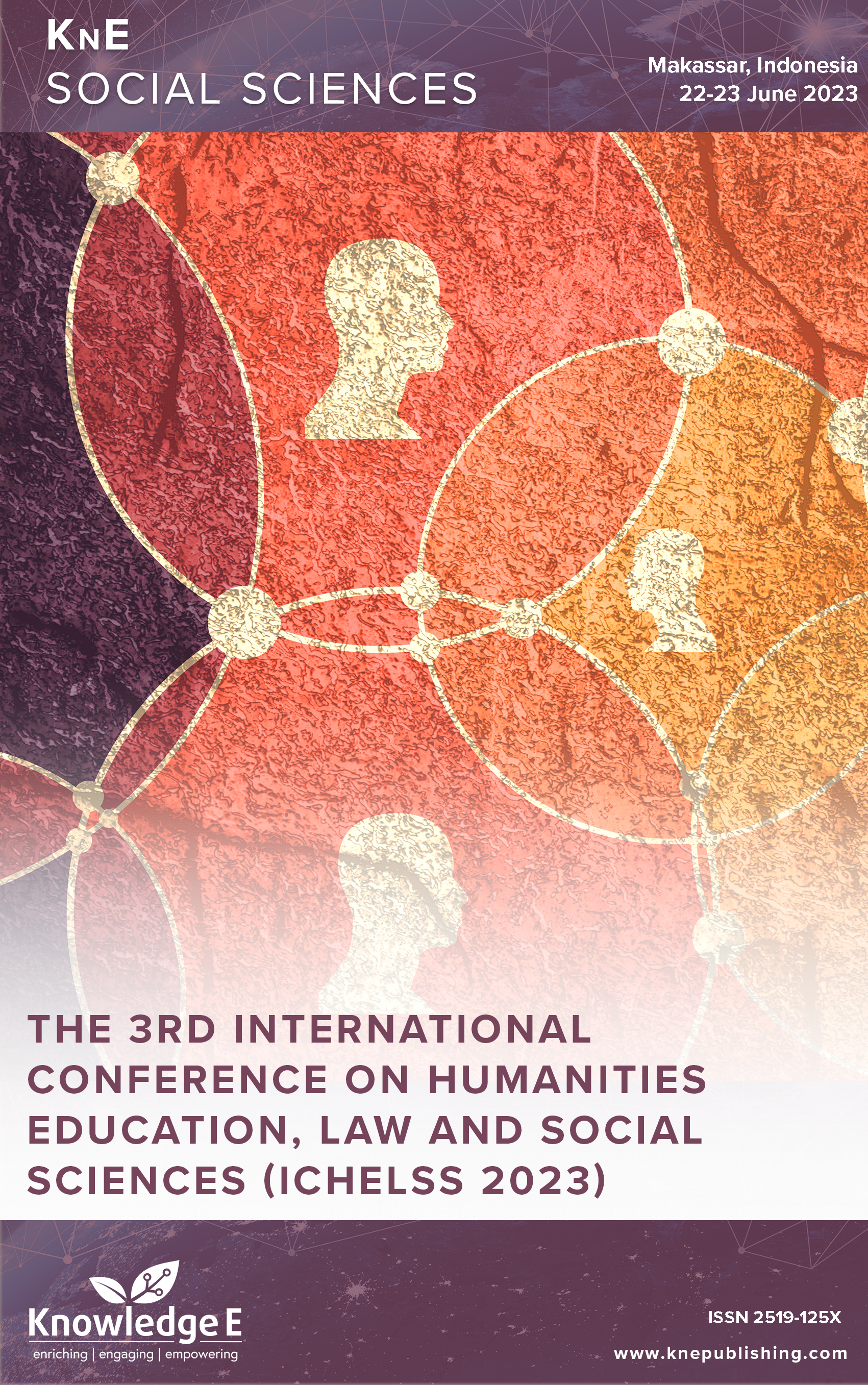Model Pure Community-smart Cities (PCSC) Components Assessment in Lembah Klang, Malaysia from Society 5.0 to Madani Society
DOI:
https://doi.org/10.18502/kss.v9i2.14871Abstract
Pure community is one of the elements that must be present to create a holistic smart city that is not only focused on economic development. This study aims to measure the level of development of the pure community in the cities of the Klang Valley, Malaysia. The research was conducted at the Klang Valley, Peninsular Malaysia. This study uses cluster sampling to select the respondents. Stratified sampling is a technique used for dividing the population into specific characteristics, and then using simple random sampling, samples are taken from each population. Overall, the level of pure community in Malaysia’s Klang Valley shows that they have a high value of good citizens. Despite this, it is crucial to put a guideline that allows the involvement of urban citizens to carry out mutual responsibilities in the location of their residence to be more organized. The government should be able to create an appropriate task force in the housing area that involves shared responsibility between the city’s residents.
Keywords: smart city development, pure community, Model PCSC
References
Lim S, Malek JA, Hussain MY, Tahir Z. Citizen participation in building citizen-centric smart cities. Geogr OnlineTM Malaysian J Soc Sp. 2018;14(4):42–53. DOI: https://doi.org/10.17576/geo-2018-1404-04
Lim S, Malek JA, Hussain MY, Tahir Z. The behaviours and job positions of citizens in smart cities’ development. Plan Malaysia J Malaysian Inst Planners. 2019;17(2):133– 45. DOI: https://doi.org/10.21837/pm.v17i10.635
Malek JA, Baharudin RA. Smart City (SC)-Smart Village (SC) and the “Rurban” concept from a Malaysia-Indonesia perspective. African J Hosp Tour Leis. 2019;1–7.
Monzon A. Smart cities concept and challenges: Bases for the assessment of smart city projects. In: SMARTGREENS 2015 - 4th International Conference on Smart Cities and Green ICT Systems, Proceedings, IS-11-IS-21. 2015. DOI: https://doi.org/10.1007/978-3-319-27753-0_2
Marsal-Llacuna ML, Colomer-Llinàs J, Meléndez-Frigola J. Lessons in urban monitoring taken from sustainable and livable cities to better address the Smart cities initiative. Technol Forecast Soc Change. 2015;611–622. DOI: https://doi.org/10.1016/j.techfore.2014.01.012
Berntzen L, Johannessen MR. The Role of Citizens in “ Smart Cities”. 2016.
Giffinger R, Fertner C, Kramar H, Kalasek R, Pichler N, Meijers E. Smart cities: Ranking of European medium-sized cities. Vienna: Vienna University of Technology; 2007.
Willems J, Bergh J Van den, Viaene S. Smart city projects and citizen participation: the case of London. Public Sector Management in a Globalized World. 2017;249–66. DOI: https://doi.org/10.1007/978-3-658-16112-5_12
Mutiara D, Yuniarti S, Pratama B. Smart governance for smart city. In: IOP Conference Series: Earth and Environmental Science. 2018. DOI: https://doi.org/10.1088/1755-1315/126/1/012073
Cardullo P, Kitchin R. Being a ‘citizen’ in the smart city: Up and down the scaffold of smart citizen participation. Ireland: County Kildare; 2017. DOI: https://doi.org/10.31235/osf.io/v24jn
da Silva CA, dos Santos EA, Maier SM, da Rosa FS. Urban resilience and sustainable development policies: An analysis of smart cities in the state of São Paulo. Rev Gest. 2020;27(1):61–78. DOI: https://doi.org/10.1108/REGE-12-2018-0117
Jabatan Perancangan Bandar dan Desa. Garis Panduan Perancangan dan Pembangunan Sejagat. Kementerian Perumahan dan Kerajaan Tempatan Malaysia; 1997.
Howe D. Attachment across the lifecourse: A brief introduction. Basingstoke: Palgrave Macmillan; 2011. DOI: https://doi.org/10.1007/978-0-230-34601-7
Christakis NA. The Evolutionary Origins of a Good Society. New York, Boston, London, Little, Brown Spark; 2019.
Edwards S. Youth Movements, Citizenship and the English Countryside: Creating Good Citizens 1930-1960. J Hist Child Youth. 2020;13(1):146–8. DOI: https://doi.org/10.1353/hcy.2020.0034
Zakaria M. Kuala Lumpur Telaga Biru Sdn. Bhd. In: Ensiklopedia Adab. 2020.
Šulyová D, Vodák J. Managing Diversity in Europe (London), North America (New York) and Asia (Singapore). Sustainability. 2020;12(22):1–11. DOI: https://doi.org/10.3390/su12229463
Julsrud DTE, Krogstad DJR. Is there enough trust for the smart city? exploring acceptance for use of mobile phone data in oslo and tallinn. 161(120314). Technol Forecast Soc Chang. 2020;161(120314). DOI: https://doi.org/10.1016/j.techfore.2020.120314
Schwab K. The Fourth Industrial Revolution. World Economic Forum. 2016;
Baudier P, Ammi C, Lecouteux A. Employees’ acceptance of the healthcare internet of things: a source of innovation in corporate human resource policies. J Innov Econ Manag. 2019;3:89–111. DOI: https://doi.org/10.3917/jie.pr1.051
Hakovirta M, Denuwara N. How COVID-19 Redefines the Concept of Sustainability. Sustain 2020, 12, 3727. 2020; DOI: https://doi.org/10.3390/su12093727
Kasayanond A, Umam R, Jermsittiparsert K. Environmental Sustainability and its Growth In Malaysia by Elaborating the Green Economy and Environmental Efficiency. Int J Energy Econ Policy. 2019;9(5):465–473. DOI: https://doi.org/10.32479/ijeep.8310
Kumwenda S. Challenges to Hygiene Improvement in Developing Countries: The Relevance of Hygiene to Health in Developing Countries. . London: IntechOpen Publisher; 2019. DOI: https://doi.org/10.5772/intechopen.80355
Delcea C, Crăciun L, Ioanăș C, Ferruzzi G, Cotfas L-A. Determinants of Individuals’ E-Waste Recycling Decision: A Case Study from Romania. Sustain 2020, 12, 2753. 2020; DOI: https://doi.org/10.3390/su12072753
Krejcie R V, Morgan DW. Determining sample size for research activities. Educ Psychol Meas. 1970;30(3):607–10. DOI: https://doi.org/10.1177/001316447003000308
Creswell JW, Poth CN. Qualitative inquiry and research design: Choosing among five approaches. Sage publications; 2016.
Malek JA, Lim SB, Yigitcanlar T. Social Inclusion Indicators for Building Citizen-Centric Smart Cities: A Systematic Literature Review. Sustain 13, 376. 2021; DOI: https://doi.org/10.3390/su13010376
Tahir Z, Abdul Malik J, Ibrahim MA. Developing Smart Ict In Rural Communities In Malaysia Through The Establishment Of Telecenters. E-Bangi, J Soc Scinces Humanit. 2016;11(1):227–242.
Carvalho L. Smart cities from scratch? A socio-technical perspective. Cambridge J Reg Econ Soc. 2015;8(1):43–60. DOI: https://doi.org/10.1093/cjres/rsu010
Kitchin R. Making sense of smart cities: Addressing present shortcomings. Cambridge J Reg Econ Soc. 2015;8(1):131–6. DOI: https://doi.org/10.1093/cjres/rsu027
de Waal M, Dignum M. The citizen in the smart city. How the smart city could transform citizenship. Inf Technol. 2017;59(6):263–73. DOI: https://doi.org/10.1515/itit-2017-0012
Sidani D, Veglianti E, Maroufkhani P. Smart Cities for a Sustainable Social Inclusion Strategy – A Comparative Study between Italy and Malaysia. Pacific Asia J Assoc Inf Syst. 2022;14(2). DOI: https://doi.org/10.17705/1pais.14203
Boeri A, Longo D, Palma M. Climate-neutral and smart cities: a European policies’ overview. WIT Trans Ecol Environ 243. 2021;3–14. DOI: https://doi.org/10.2495/SC210011

